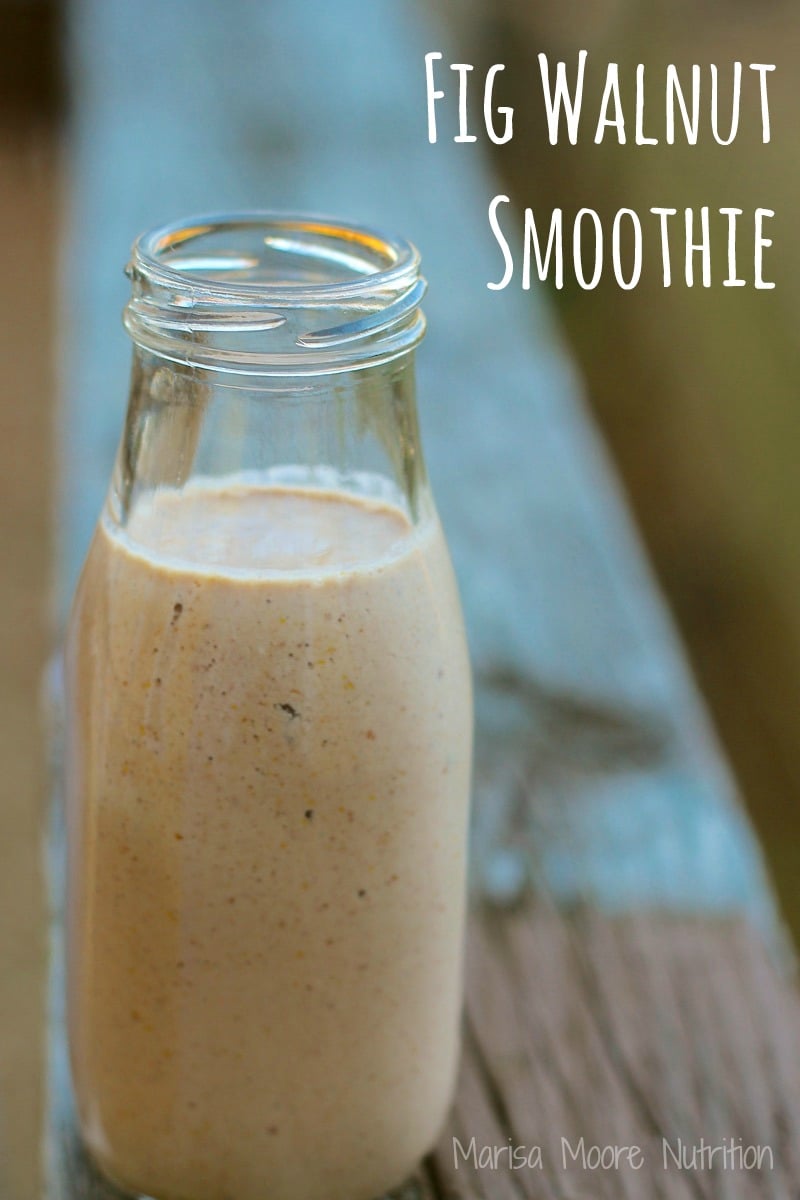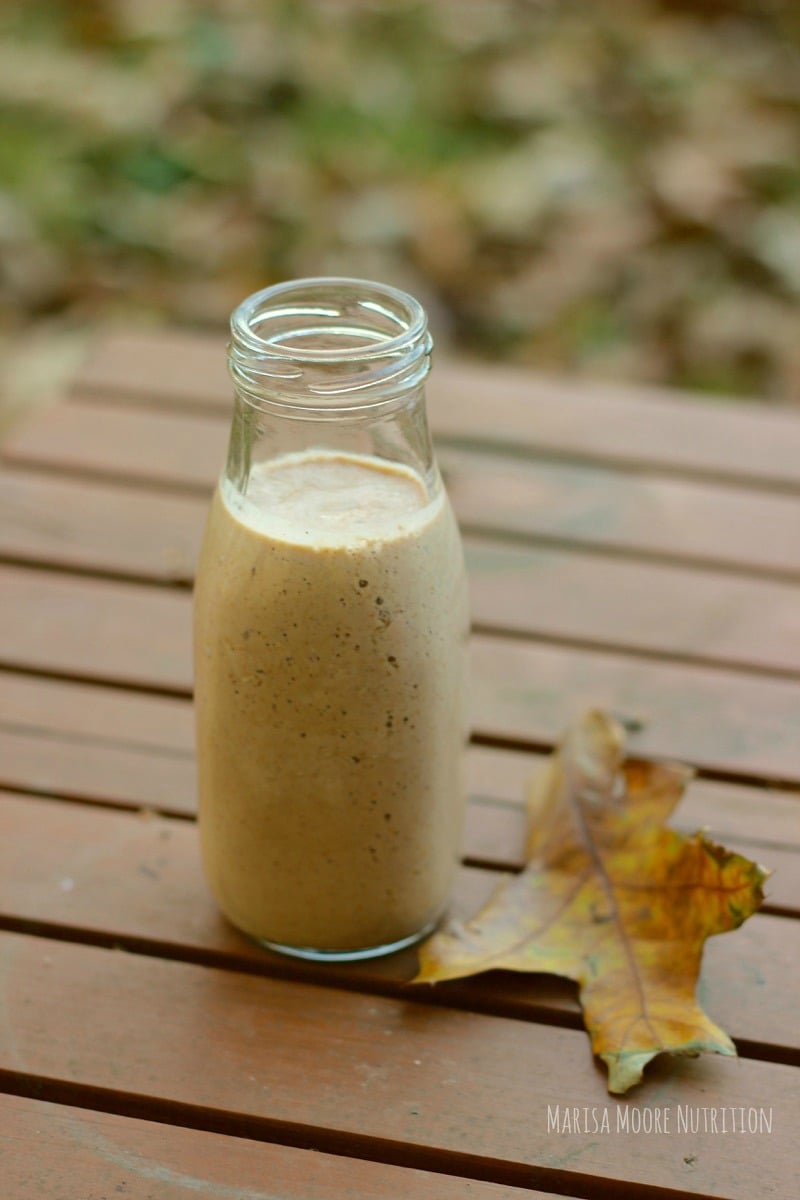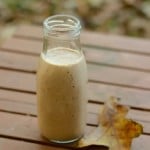This no-sugar added Fig Walnut smoothie is packed with probiotics and fiber and may help keep your gut happy this holiday season.
Did you go to a party this weekend? Did you enjoy the mini quiches, cheeses, dips, cookies and creamy, boozy beverages? While these are all good going down… sometimes the motley mix of holiday treats can leave you feeling icky.
Yep. Tis’ the season to eat a bunch of different foods and regret it shortly thereafter. Been there. Done that. And will probably do it again. But today I want to share this probiotic packed smoothie designed to get you back on track.
This Fig Walnut Smoothie is naturally sweetened with dried figs and it gets a hint of sweetness from the cinnamon and vanilla extract. The figs add flavor, body and fiber. The walnuts add depth, texture and a bit of heart healthy omega-3 fatty acids. The star of the smoothie though is kefir – the probiotic packed drinkable yogurt cousin.
Thanks to dietetic intern, Shamera Robinson, for sharing the following about probiotics:
As a dietetic intern, I am always on the receiving end of any nutrition related question from friends and family. Just today, my best friend called to tell me she wants to take probiotics. Her announcement was followed by a simple question. “What are probiotics?” After hearing this question, I realized probiotic is a buzzword worth explaining…
Lets start at the beginning, shall we?
What are probiotics?
Your gut is filled with bacteria, both good and bad. Maintaining the proper balance between these microorganisms is critical for overall gut health. Sounds intense, right? Probiotics are simply the beneficial bacteria and yeast that help your GI tract flourish. These live cultures most commonly include the bacterial species Lactobacillus and Bifidobacterium, in addition to Saccharomyces yeasts.
Why use them?
In an ideal world, the bacteria in our gut would always maintain a symbiotic relationship. Too bad this rarely happens. Things like antibiotics, which are meant to destroy bad bacteria, can also wipe out the good bacteria throughout the gastrointestinal tract. Laxative use, imbalanced diet, and stress are a few things that can also disrupt your gut flora.
Probiotics, or good bacteria, can help achieve microbial balance along the GI tract. This can reduce gut inflammation and improve digestion. Studies have also associated probiotic use with heightened immune function, weight loss, and decreased colon cancer risk. While these benefits may not be seen in every case, the right amount of probiotic can certainly assist in improving overall health.
[Tweet “Curious about probiotics? Learn more and get @marisamoore’s Fig Walnut Smoothie #recipe!”]
Where to get them?
So you’re sold on the benefits, but you do not know the best way to add probiotics to your daily routine. Bifidobacterium and Lactobacillus species can normally be found in fermented dairy products, such as yogurt and kefir. Fermented vegetables (ex. sauerkraut) and fermented soy products (ex. tempeh) may also contain probiotics, but the concentration is largely uncertain.
Individuals with specialized GI complications may benefit from probiotic supplements. Always be sure that any dietary supplements comply with FDA labeling regulations. Nonetheless, food is the best source of probiotics for individuals looking for general health benefits.
How to make probiotics a part of your day
- Whether snack or dessert, small yogurt containers pack a powerful probiotic punch.
- Add kefir to your morning smoothie mix for a healthy bacteria boost.
- Sprinkling sauerkraut on a sandwich can quickly enhance the flavor and gut health.
- If you are still looking for something a bit different, try topping your salad with tempeh. At less than $2 per package, Trader Joe’s 3 Grain Organic Tempeh can certainly be added to the list of budget buys.
Fig Walnut Smoothie
Ingredients
- 1 c plain kefir
- 4 roughly chopped dried figs
- 1 T walnuts
- ¼ t cinnamon
- Splash of vanilla extract
Instructions
- Add all ingredients to a blender. Puree until smooth. Serve immediately.
Notes
- Use dried figs that are still moist and succulent. If your figs are older, they might be a bit dry and difficult to blend.
- Kefir provides probiotics here but you can use a thick and creamy plant milk such as almond, cashew or walnut milk if you can find it. Yogurt will also work but you'll need add a splash of milk to thin it out.
Nutrition
Special thanks to dietetic intern Shamera Robinson for her contribution to this post.





Leave a Reply